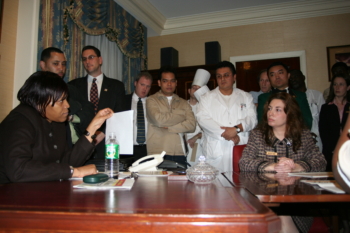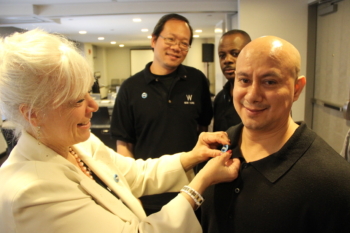Union Representation
As union-represented workers, we have the right to negotiate over anything that affects us at work. We can challenge any disciplinary or managerial decisions that we consider unjust. We can negotiate to improve our working conditions. And we can demand better wages and benefits. Our power comes from our strength in numbers, our solidarity and willingness to fight for strong contracts, the pooling of our financial resources to employ tough and experienced representatives, organizers, and lawyers, and our Defense Fund, which we can rely upon if we need to go out on strike to get our demands met.
Contract Enforcement

A collective bargaining agreement (union contract) is a legally-binding agreement between our Union and the employer. Our contracts guarantee the workers we represent many important rights which many non-union workers don’t have, rights like job security, safety protections, and seniority and scheduling rights. The workers represented by our Union have experienced representatives and lawyers who enforce the contract at their workplace, defend them in disciplinary cases, and negotiate over their working conditions.
Delegates and Assistant Delegates
Union Delegates and Assistant Delegates are members who work in the shops but who also act as unpaid rank-and-file union representatives. They are appointed by HTC to represent the workers in specific departments, classifications and shifts. Non-binding referendum votes are often taken to ascertain the preference of the members regarding the appointment of Delegates and Assistant Delegates.
Delegates and Assistant Delegates form the "first line of defense" in the grievance and contract enforcement process. Members should normally raise any grievance they have with their Delegate or Assistant Delegate first. To ensure their ability to vigorously represent the workers, Delegates and Assistant Delegates enjoy enhanced contractual protections covering discharge, suspensions, and layoffs.
Employees represented by our Union and covered by an HTC contract have a right to insist that a Delegate or Assistant Delegate be present to represent them in the event of any disciplinary meeting with management.
Business Agents
Your Business Agent is a Union representative assigned by HTC to your shop to enforce your rights under the contract, and to handle grievances.
Whether employed by HTC or an affiliated local, Business Agents perform their representational duties under the aegis and direction of HTC. To reach your Business Agent, call (212) 245-8100 and press option #1.
Regional Directors
The Union representatives who directly supervise the contract enforcement and representational work of the Business Agents are the HTC Regional Directors. To reach your Regional Director, call (212) 245-8100 and press option #1.
H.E.A.T. Representatives

H.E.A.T. Representatives are the Union representatives responsible for "internal organizing”, that is building and strengthening the unity and militancy of the Union's membership. The H.E.A.T. Representatives coordinate the Union's rank-and-file leadership organization - the H.E.A.T. System (H.E.A.T. stands for Hotel Employees Action Team).
It's the job of the H.E.A.T. Representatives (and the H.E.A.T. System) to keep the membership of the Union informed, organized, and united, and to mobilize our members when unified action is needed (for example: in a contract fight, to support a drive to organize a non-union hotel, and to build our Union’s political power).
For more information about the H.E.A.T. System, click here.
To contact your H.E.A.T. Representative, call the H.E.A.T. Department at 212-245-8100 and press option #2.
Organizers

The HTC Organizing Team is responsible for "external organizing”, that is helping non-union hotel workers to unionize their hotels). One of the most important reasons the members of our Union enjoy the best contract for hotel workers in the world is that New York's hotel industry is so heavily unionized. The term used to describe the percentage of the industry that is unionized is union density. High union density means the workers have more bargaining power. In cities where the hotel industry has a high union density, hotel workers have higher wages and better benefits. In cities where the hotel industry has low union density, hotel workers have low pay, and few or no benefits.
The owners and management companies of non-union hotels exploit their employees, usually by paying them much lower wages than what the workers we represent earn, and offering few or no benefits. Obviously, if hotels operate in our city while paying poverty wages, the conditions our union has fought to establish over the last 80 years and the future of our contracts and our Union itself are endangered. We must face and defeat this threat – and we can. It is therefore vital for our Union to continue to organize any new hotels and all the existing non-union hotels.
Union members who have any information that might help the union organize non-union hotels should contact the union's Organizing Team at 212-245-8100 and select option #6.


